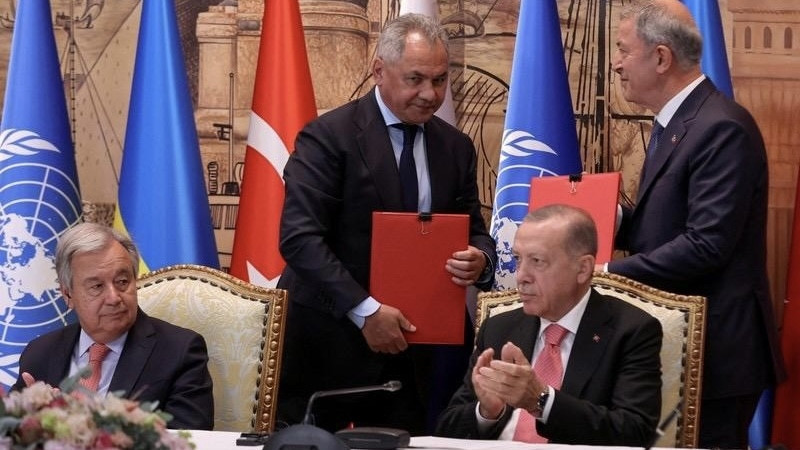The deal, which will allow the resumption of vital grain exports from Ukraine through three ports in the Black Sea, was signed in Istanbul, Turkey, and was brokered by the UN and Ankara. Speaking after the agreement was signed, the UN representative noted that the world's largest multilateral organisation believes that the deal will be fully implemented so that the grain exports should reach their pre-conflict levels of 5 million tonnes per month.
The conflict in Ukraine and Western sanctions against Russia have been disrupting grain supplies, driving up global food prices and threatening to push millions in poor countries into starvation. There are still 25 million tonnes of wheat and cereals stuck in Ukraine and the Eastern European country is expected to harvest 60 million tonnes this year.
Immediately after Russia and Ukraine signed the deal to resume exports of Ukrainian grain, the UN Secretary-General Antonio Guterres said the agreement will help developing countries on the edge of bankruptcy escape from the risk of default. Turkish President Recep Tayyip Erdogan, who played a key role in the negotiations, expressed his hope that the deal will open the prospect of peace in Ukraine.
Highly valuing the agreement, the EU High Representative for Foreign Affairs and Security Policy Josep Borrell said this is a step in the right direction. Canadian Prime Minister Justin Trudeau announced that the Group of Seven (G7) will closely monitor the situation to ensure that Ukraine's grain exports through the Black Sea return to normal as before the conflict.
From Washington, US Secretary of State Antony Blinken and his Ukrainian counterpart Dmytro Kuleba discussed the issue of grain exports from the Eastern European country within the framework of the G7 Summit, the North Atlantic Treaty Organisation (NATO) and the Foreign Ministers Meeting of the Group of Twenty (G20). The conflict in Ukraine and Western sanctions against Russia have been disrupting grain supplies and increasing the risk of a food crisis in many parts of the world.
Since the beginning of the year, wheat and corn prices have risen sharply. As stated during a recent session of the UN Security Council, there are only 10 weeks of wheat supply left in global stockpiles. This situation is worse than during the 2007-2008 crisis.
Since late February 2022, Ukraine's ports in the Black Sea have been shut down, causing delays in seaborne exports resulting in grains being backlogged in warehouses of the Eastern European country. Ukraine is trying to export agricultural products via road, river and rail. However, logistical obstacles are limiting export volumes at a maximum of two million tonnes per month. The Food and Agriculture Organisation (FAO) of the UN said Ukraine still had 18 million tonnes of last year’s grain and oilseed harvest stuck in storage.
FAO said it had received $17 million from Japan to address grain storage problems in Ukraine, towards promoting its exports as global food prices remain high. Analysists hope that the agreement will reduce the current high food prices.
















